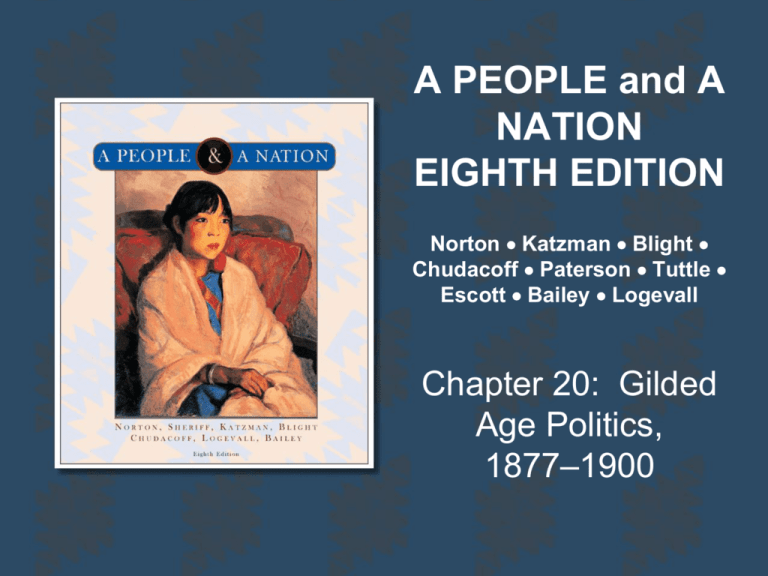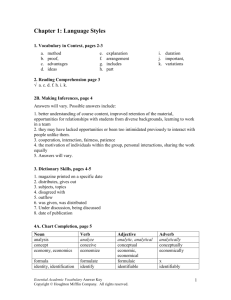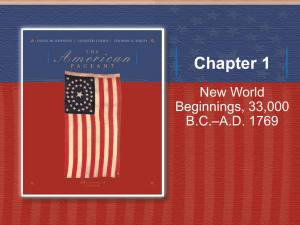
A PEOPLE and A
NATION
EIGHTH EDITION
Norton Katzman Blight
Chudacoff Paterson Tuttle
Escott Bailey Logevall
Chapter 20: Gilded
Age Politics,
1877–1900
Ch.20: Gilded Age Politics,
1877–1900
• Twain’s term reflect era’s corruption as
powerful special interests pursue profit
• Despite venality, states & US Gov’t pass
reforms
• Basis for more active government in 1900s
• Political exclusion for majority of Americans
• Women, people of color, poor, recent
immigrants lack vote/access
• 1890s: political turmoil & dissent explode
Copyright © Houghton Mifflin Company. All rights reserved.
20 | 2
I. Nature of Party Politics
•
•
•
•
Extensive public interest/participation
80% of those eligible vote in elections
Many communal aspects (parades, picnics)
Politics reflect pluralism; different groups
compete for power & form fragile coalitions
• Native-born Protestants (Republican)
advocate government-enforced morality
(Sabbath laws)
• Immigrants (Democrat) oppose
Copyright © Houghton Mifflin Company. All rights reserved.
20 | 3
II. Party Factions
• Even when corrupt, politicians (Blaine)
evoke strong supporter loyalty
• Equilibrium till 1890s
• Neither party dominate US Gov’t
• Factions divide both parties
• All pursue spoils of office and use vote
fraud
• At state level, one party usually dominate
• Dictatorial boss, often a senator, run state
party
Copyright © Houghton Mifflin Company. All rights reserved.
20 | 4
III. Sectional Controversy; Civil
Service Reform
• Both parties exploit memories of Civil War
• Union vets lobby successfully for pensions
• Spoils system accelerate (award
government jobs on political connections,
not merit)
• Grant’s scandals & Garfield’s assassination
produce Pendleton Civil Service Act, 1883
• Civil Service Commission oversee 10% of
US Gov’t jobs with competitive exams
Copyright © Houghton Mifflin Company. All rights reserved.
20 | 5
IV. Railroad Regulation
• Railroads alienate many
• Charge high rates on short hauls to
compensate for lower rates on more
competitive long hauls
• Farmers lobby for regulation
• States pass some, but Supreme Court void
them
• Interstate Commerce Act (1887) establish ICC
to ban long haul/short haul rate discrimination
• Courts later weaken ICC
Copyright © Houghton Mifflin Company. All rights reserved.
20 | 6
V. Tariff Policy
•
•
•
•
Goal = to protect US industries
Become tool of private interests for high profit
Republicans advocate high tariffs
Democrats want lower tariffs because high
tariffs raise prices for consumers & hurt farmers
• Manufacturers win high tariffs
• McKinley Tariff, 1890; Dingley Tariff, 1897
• Critics see tariffs as tool of privileged business
Copyright © Houghton Mifflin Company. All rights reserved.
20 | 7
VI. Monetary Policy
• Debtor v. creditor debate over money supply
• Farmers & sm. businesses argue larger supply
with silver will help them with high-interest debts
• Creditors/investors profit from limited supply
(backed solely by gold)
• US Gov’t stop minting silver coins (1873)
• Creditors block widespread US Gov’t purchase
of silver (late 1800s); anger debtors
• Debate = class & sectional
Copyright © Houghton Mifflin Company. All rights reserved.
20 | 8
VII. Tentative Presidents
• Presidents try to restore office weakened
by Johnson’s impeachment & Grant’s
scandals
• Initiate some reform laws and use veto
• Disputes within their parties weaken them
• Close elections force presidents to
respond to supporter demands for spoils
• Hayes, Garfield, & Arthur try to limit
abuses
Copyright © Houghton Mifflin Company. All rights reserved.
20 | 9
VIII. Cleveland (1885–89, 1893–97)
Harrison (1889–93)
• Both support civil service reform, but to win
their parties engage in vote fraud (1888)
• Both also need business support to win
• Prevent them from lowering tariffs
• Like most members of Congress & state
gov’ts, presidents try to address problems
• Special interests restrict reform, late 1800s
• After 1900, new reforms build on this base
Copyright © Houghton Mifflin Company. All rights reserved.
20 | 10
IX. Discrimination;Violence Against
African Americans
• Wealthy white landowners exploit racism
to divide poor whites & poor blacks
• Poor whites fear competition from blacks
• Most African Americans live in South
• 1880: 90% of southern blacks work in
agriculture/domestic service (same as
slavery)
• 1889–1909: whites lynch > 1700 blacks
• Ida Wells protest in A Red Record (1895)
Copyright © Houghton Mifflin Company. All rights reserved.
20 | 11
X. Disenfranchisement
• After end of Reconstruction, white leaders
undermine black-male voting with
restrictions
• Poll taxes of $1–$2
• Supreme Court uphold restrictions if not
explicitly racist (property requirement)
• Mississippi Plan (1890) use subjective
literacy test on state constitution and poll tax
• Measures also prevent poor whites from
voting
Copyright © Houghton Mifflin Company. All rights reserved.
20 | 12
XI. Legal Segregation
• Supreme Court void civil rights laws (1883)
and uphold segregation (Plessy, 1896)
• State & local Jim Crow laws multiply
• Provide daily signs of inferiority to blacks
• Separate hospitals, cemeteries, Bibles, etc.
• Some blacks protest; others respond by
seeking education in all-black coeducational
colleges
• Black women (Wells) lobby for reform laws
Copyright © Houghton Mifflin Company. All rights reserved.
20 | 13
XII. Woman Suffrage
• Women debate how to attain vote
• American Woman Suffrage Association
focus on suffrage efforts in states
• National Woman Suffrage Association lobby
US Gov’t for suffrage and other rights
• Merge into NAWSA (1890); by 1910, 11
states (most in West) allow female suffrage
• Early training for women in political activity
Copyright © Houghton Mifflin Company. All rights reserved.
20 | 14
XIII. Agrarian Unrest & Populism
• Economic distress spark mass rural revolt
• Many whites & blacks in South suffer debt
as tenants or sharecroppers with crop
liens
• Furnishing merchants inflate
prices/interest
• White yeomen try commercial agriculture
• Drop in cotton prices put them in debt
• Western farmers face price declines (from
overproduction) and high railroad rates
Copyright © Houghton Mifflin Company. All rights reserved.
20 | 15
XIV. Grange Movement; The White
Hats
• Voluntary organizations, 1860s–1870s
• First social; then move into economics
with cooperatives, but falter because of
lack of capital
• Lobby for railroad regulation
• Business interests oppose Granger laws
• Courts side with business & void laws
• In Southwest, Mexican farmers try to
resist white encroachment on their lands,
but fail
Copyright © Houghton Mifflin Company. All rights reserved.
20 | 16
XV. Farmers’ Alliances (late 1880s)
• Form first in TX among farmers in debt
• Spread to Great Plains as well as South
• Subtreasury Plan call for US Gov’t loans
& warehouses to help with credit & low
prices
• Hurt by racism (whites refuse to join
blacks)
• Also sectional tensions over tariff
• North accept high tariffs; South oppose
• Groundwork for Populist party
Copyright © Houghton Mifflin Company. All rights reserved.
20 | 17
XVI. Rise of Populism
• Alliance in KS form People’s Party, 1890
• National convention in Omaha, NE, 1892
• Flawed on race & ethnicity, Populists hope
US Gov’t will fix inequality/abuses of elite
• Gov’t ownership of railroads, farm loans,
silver coinage, income tax, election of
senators
• In 1892 election, Populists successful in
West
• Weak in vote-rich Northeast
Copyright © Houghton Mifflin Company. All rights reserved.
20 | 18
XVII. The Depression of the 1890s
• Overproduction and debt by factories create
chain reaction of business & bank defaults
• 1893–97 depression cause mass suffering
• Unemployment = 20%; homelessness
increase
• Currency crisis dwindle gold reserves
• Panic further threaten economy
• Cleveland deal with Morgan to stop gold
drain
• Public angry at Morgan’s profit
Copyright © Houghton Mifflin Company. All rights reserved.
20 | 19
XVIII. Consequences of the
Depression
• Economy slowly recover, esp. with AK
gold
• Depression show dangers of
consolidation
• Debts/defaults by huge businesses & by
consumers affect everyone
• Foreign economies also affect USA
• Overseas competition worsen US
depression
• New national & global economy
Copyright © Houghton Mifflin Company. All rights reserved.
20 | 20
XIX. Depression-Era Protests
• Worker protests against exploitation
accelerate
• Building since 1877 rail strike
• Some accept socialism
• Worker control of factories will solve
problems by removing capital’s fixation on
profits
• Early socialists attract few workers
• Splinter into small debating societies
• Debs unite socialists and spur greater
activity
Copyright © Houghton Mifflin Company. All rights reserved.
20 | 21
XX. Coxey’s Army (1894)
• To relieve unemployment, call for public
works program (roads) with funds from
US Gov’t
• Organize 1st march on capital
• Distressed families march non-violently to
DC
• DC police crush march with violence
• Coxey not socialist
• Political/business leaders see any dissent
as threat
Copyright © Houghton Mifflin Company. All rights reserved.
20 | 22
XXI. Populists
• Hurt by lack of funding & organization
• Voters hesitate to leave two major parties
• Racism stifle attempts by southern
Populists (Watson) to unite poor whites &
blacks
• Debate whether to ally with Democrats or
remain independent third party
• National debate over free coinage of
silver cause divisions within two major
parties
Copyright © Houghton Mifflin Company. All rights reserved.
20 | 23
XXII. Election of 1896
• McKinley = Republican nominee
• Bryan = Democrat nominee
• Populists also nominate Bryan for his free
silver stance & anti-privilege rhetoric
• Republicans win major victory
• McKinley convince many workers that
pro-business policies (tariffs) will create
jobs
• Bryan’s fixation on free silver prevent
formation of rural-urban coalition
Copyright © Houghton Mifflin Company. All rights reserved.
20 | 24
XXIII. The McKinley Presidency
(1897–1901)
• His election also reflect importance of
organization and advertising (Hanna)
• Populists collapse after 1896 loss
• Business interests remain ascendant in
politics
• Gold Standard Act (1900): back all paper
money by gold
• McKinley raise tariff rates further
• Economic recovery help with re-election,
1900
Copyright © Houghton Mifflin Company. All rights reserved.
20 | 25
Summary: Discuss Links to the
World & Legacy
• Compare/ contrast Russian & American
Populism?
• How & why both fail?
• Long-term influence of both?
• How might the original Wonderful Wizard
of Oz (1900) reflect tensions of era?
• The powerful deceive/manipulate ordinary
people
• Legacy of debate over meaning of
popular culture?
Copyright © Houghton Mifflin Company. All rights reserved.
20 | 26


